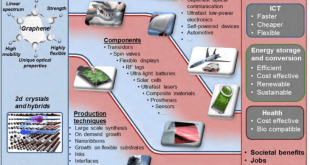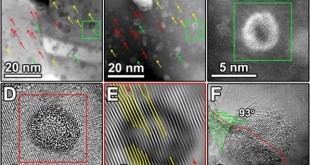Graphene is a 1-atom-thick layer of tightly bonded carbon atoms arranged in a hexagonal lattice. Graphene the world’s first 2D nanomaterial, is widely regarded as the “wonder material” of the 21st century due to the combination of its extraordinary properties. As a single layer of graphite, it is the thinnest …
Read More »Biological Synthesis of Metallic Nanoparticles by Bacteria, Fungi and Plants can be utilized for electromagnetic pulse protection, according to US Army
Nanoparticles have unique thermal, optical, physical, chemical, magnetic and electrical properties compared to their bulk material counterparts. These features can be exploited for next generation biosensors, electronics, catalysts and antimicrobials. Metallic nanoparticles are one important and widely studied group of materials, showing great diversity and many different uses Over …
Read More »Resistive RAM (RRAM), a Non-volatile memory (NVM) technology, key to support artificial intelligence on the Internet of Things, or “edge AI”.
Ever-growing data generation driven by mobile devices, the cloud, the IoT , and big data, as well as novel AI applications, all part of the megatrends, requires continuous advancements in memory technologies. RRAM is a nonvolatile memory that is similar to PCM. The technology concept is that a dielectric, …
Read More »Scientists creating tough and lightweight nanomaterials and nanoclusters for projectiles or armor
Today’s generation of body-armour systems can provide protection at various levels designed to defeat most common low- and medium-energy handgun rounds. However, currently the highest-threat-level ballistic needs in the market are fulfilled by special, high performance ceramics that tend to be very costly, fragile for standard handling, extremely heavy and …
Read More »DARPA’s AMD to accelerate creation of novel, high-performance molecules for Military Applications
The Defense Sciences Office (DSO) at the Defense Advanced Research Projects Agency (DARPA) is soliciting innovative research proposals in the area of autonomous molecular design to accelerate the discovery, validation and optimization of new, high-performance molecules for Department of Defense (DoD) needs. DARPA Accelerated Molecular Discovery (AMD) program, aims to …
Read More »The emerging field of phonon management allow novel phononic materials and devices to control sound and heat.
The phonon is the physical particle representing mechanical vibration and is responsible for the transmission of everyday sound and heat. Understanding and controlling the phononic properties of materials provides opportunities to thermally insulate buildings, reduce environmental noise, transform waste heat into electricity and develop earthquake protection. The concept of …
Read More »Next Generation MEMS thermopile IR sensor 2.0 for Internet of Things, smart homes, environment and energy technology
In the wake of increasing electronic gadget sales, the overheating problem for battery chargers has become an increasingly common safety issue. Overheating of chargers certainly can be caused by substandard chargers, faulty batteries, or by misuse of the chargers. In worst-case scenarios the devices melt or catch fire. Unsurprisingly, this …
Read More »Molecular technologies enabling Molecular Robotics, the Ultimate Miniature Machines
The modern world is filled with macroscopic machines that perform work that we either find demanding or function in places or on length scales in which we cannot act. To date however, we have yet to develop a functional nanotechnology that operates on the scale of molecules or assemblies of …
Read More »Aerogels, world’s lightest solid, has applications in Smart buildings, Medical, Aerospace and Military
Aerogels are among the lightest materials in the world and are highly porous with strong absorption capacity and low thermal conductivity which make them highly suitable for applications oil-spill cleaning, personal care products like diapers and heat, and sound insulation. “Aerogel is what NASA uses to insulate the space …
Read More »Scientists exploring Magnetic nanoparticles for Biomedical, neuromorphic computing , Holography and LIDAR to destruction of Warfare Agents
Magnetic nanoparticles are nanomaterials consist of magnetic elements, such as iron, nickel, cobalt, chromium, manganese, gadolinium, and their chemical compounds. In most cases, the magnetic nanoparticles range from 1 to 100 nm in size and can display superparamagnetism. Magnetic nanoparticles have unique properties such as extremely large surface area per …
Read More » International Defense Security & Technology Your trusted Source for News, Research and Analysis
International Defense Security & Technology Your trusted Source for News, Research and Analysis









